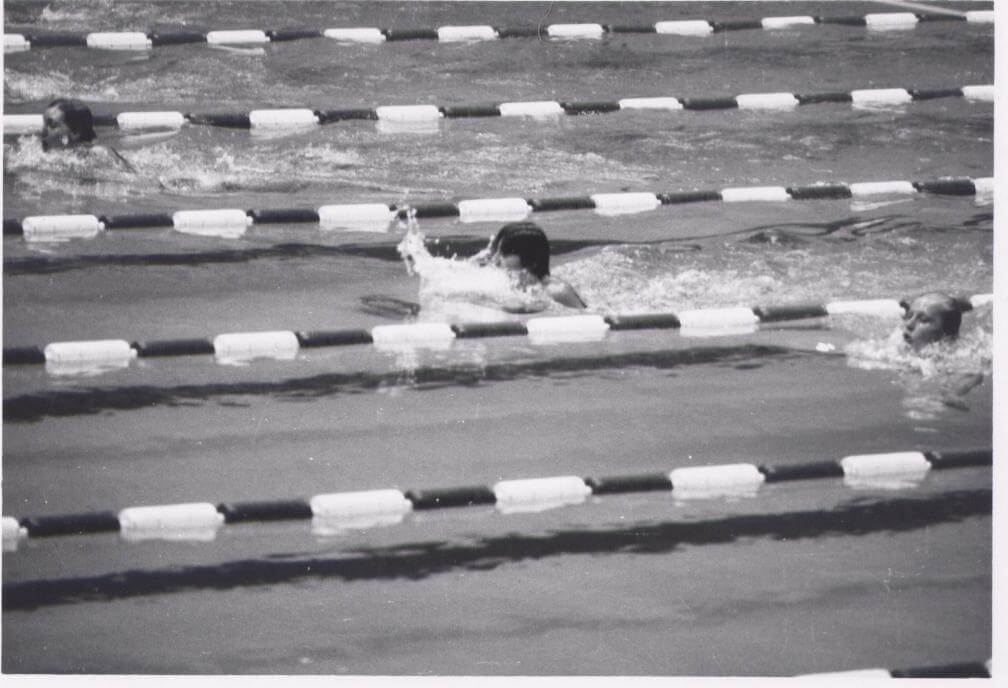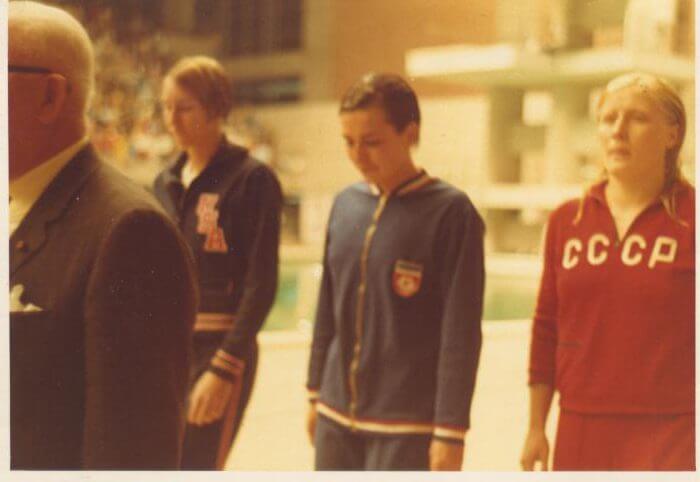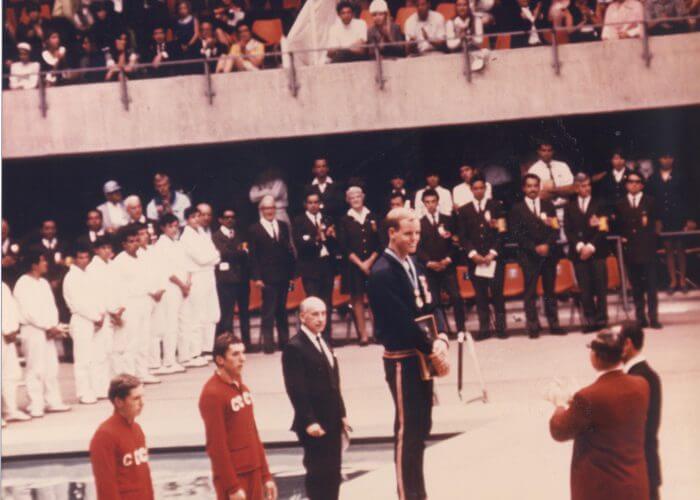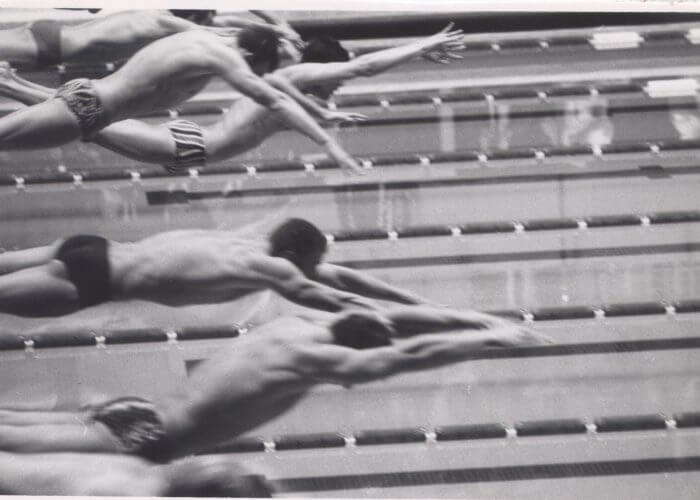50 Year Lookback of 1968 Mexico City Olympics: Major Upsets Rock Olympic Pool on Day Three

Each day through October 26, Swimming World will take you back 50 years to the 1968 Mexico City Olympics, and will re-tell the stories of those Games through archived meet recaps via the Swimming World Vault.
Read More on the 1968 Olympics
- Mark Spitz’s first gold medal
- Micki King hits board in 3m springboard final, Sue Gossick wins gold medal
October 19, 1968
Women’s 100 Breast
In the women’s 100 meter breaststroke, Catie Ball, USA, the world record holder, was the second fastest qualifier, tied with teammate Sharon Wichman at 1:16.8 a tenth back of Ava Maria Norbis of Uruguay.
In the finals, Ball stayed underwater at the start but achieved a better start than Galina Prozumenschikova, USSR, who trailed by a meter almost immediately. Uta Frommater, West Germany, took an early lead at 25 meters but Catie took the lead at about 40 meters and turned first at the halfway mark. At this point Norbis and Frommater were a meter back and it was apparent Miss Ball would need a strong kick to hold off their challenges.
Miss Prozumenschikova came up at 75 meters with one of her usual strong finishes, but in lane two, Djurdjica Bjedov, Yugoslavia, started to challenge the leaders and stroked into the lead, with Ball slipping to third . Bjedov maintained her place and held the Russian in second place while Miss Wichman put on a tremendous finish to also pass Catie and take third .
The order of finish was Bjedov, 1:15.8 (Olympic Record , new event), Prozumenschikova, 1:15.9, Wichman, 1:16.1, Frommater, 1:16.2, Ball 1:16.7, Kiyoe Nakagawa, Japan, 1:17.0, Svetlana Babanina, USSR, 1:17.2, and Norbis, 1:17.3 (1:16.7 semi-finals).

Sharon Wichman, Djurdjica Bjedov, Galina Prozumenschikova; Photo Courtesy: International Swimming Hall of Fame (ISHOF)
Miss Bjedov, a university junior said, “I train three days a week in the winter and four or five days in the summer – six to seven thousand meters a day in the summer. This is the first gold medal Yugoslavia has ever won in Olympic swimming and I am very happy. My father helps coach me. I am 21 and plan to swim in the European Championship. I didn’t fear anyone. I never heard of Catie Ball, I just swam my own race to try and win.”
Her previous best was 1:17.3.
Miss Prozumenschikova, 19, commented, “I am sad that I didn’t win as I had expected to, but I am better in the 200. I train very hard.”
Miss Wichman, 17-year old high school junior stated: “I was swimming for first but I never thought I would get a medal. I thought Catie would. I plan to swim two more years. I usually am behind in a race for three quarters and then finish strong. I didn’t think I was going good, I felt awful. I was awfully rushed, I went from the warm up pool to the shower to the pool again. I thought I’d get more rest. It really shook me . I think the times are off because of the flat turns.”
Catie Ball was able to do no better than 1:16.7 for fifth. After the race she was taken to the doctors who found her suffering from fever, swollen glands, and a virus. She was scratched from further Olympic competition, as Coach Chavoor said she had been ill since she arrived in Mexico.
Medalists:
- Djurdjica Bjedov, YUG, 1:15.8
- Galina Prozumenschikova, URS, 1:15.9
- Sharon Wichman, USA, 1:16.1
Historical Notes:
- This was the first time the women’s 100 breast was contested at the Olympics as it was the debut of six new women’s events. The 100 breast, 200 free, 800 free, 200 back, 200 fly and 200 IM made their Olympic debuts in 1968.
- Bjedov won Yugoslavia’s first and only gold medal in swimming.
- American Cathy Carr won Team USA’s first gold medal in this event in the next Olympiad in 1972.
- The Americans have three gold medals in this event, while East Germany has two.
- The Soviet Union won the first four silver medals in this event as Prozumenschikova won the silver in 1972.
- The Russians picked up their first gold medal in this event in 1992 with the likes of Yelena Rudkovskaya winning for the Unified Team in Barcelona.
Men’s 100 Breast
The Russians were favored in the men’s breaststrokes and in the 100 meter event they qualified all three swimmers, Vladimir Kosinsky, 1:07.9 (first), Nickolay Ivanovich Pankin, 1:08.1 (tie for second), and Eugeny Mikhailov, 1:08.8 (fifth). Their only threat was from Don McKenzie, USA, who tied Pankin with 1:08.1 in qualifying.
In the finals McKenzie, with his long, slow stroke, moved ahead easily, but was hard pressed by Pankin and Kosinsky and lost the lead with about 20 meters to go. At that point McKenzie put down his head and gave it everything he had to win over the Soviets in the last few meters. What a Cinderella finish for a boy who had never won a national title.
McKenzie, 21, recorded 1:07.7 to win (Olympic record, new event) over Kosinsky, 1:08.0 and Pankin, third, also 1:08.0. Jose Sylvio Fiolo, Brazil, was fourth 1:08.1, followed by Mikhailov, USSR, 1:08.4, lan O’Brien, Australia, 1:08.6 (O’Brien was the last qualifier, 1:09.0, edging out Dave Perkowski, USA, by four hundredths of a second), Alberto Foreli Lopez, Argentina , 1:08.7 and Egon Henninger, East Germany, 1:09.7.

Don McKenzie on top of the podium; Photo Courtesy: International Swimming Hall of Fame (ISHOF)
“My strategy was to go as hard as l could toward the end,” McKenzie said, “and I figured whoever could go the hardest the last 10 meters was going to win. I didn’t expect to win a gold medal before I came here, but after the prelims and semi-finals I felt l had a chance.” McKenzie added, “l didn’t know I’d won, because l was swimming with my eyes closed. I looked up into the stands and some people held up one finger and I couldn’t believe I’d won. I was shocked.”
Pankin, a 21-year-old transportation engineering student, said: “I never thought I would lose, Never! After setting the world record this year? This is the first time l’ve ever seen or heard of McKenzie, but I congratulate him.”
“It was a bad coincidence for me, but luck was on McKenzie’s side this time,” commented Kosinsky, a first year medical student in Russia.
The Soviet swimmer was obviously shocked, as he wept behind the stand and only joined the winners at the victory stand.
Medalists:
- Don McKenzie, USA, 1:07.7
- Vladimir Kosinsky, URS, 1:08.0
- Nickolay Pankin, URS, 1:08.0
Historical Notes:
- This was the first time this event had been contested at the Olympics as it was one of three new events to the men’s program. The 100 fly and 200 IM were the other two.
- The Russians have yet to win the men’s 100 breast gold medal at the Olympics.
- The Americans have the most gold medals in the men’s 100 breast with four, but have not won since 1992 when Nelson Diebel won the gold medal. Japan and Great Britain each have three gold medals in the event.
Women’s 100 Free
The women’s 100 meter freestyle saw a United States sweep as Jan Henne, 21, upset Sue Pedersen, 15, who had beaten Jan in both the U.S. Nationals and Olympic Trials, and Linda Gustavson, 18. Jan posted 1:00.0 to win with Sue second, and Linda third, both at 1:00.3.
Finishing behind the Americans was Marion Lay, Canada, 1:00.5, Martina Grunnert, East Germany, 1:01.0, Alexandra Jackson, Great Britain, 1:01.0, Mirjana Segrt, Yugoslavia, 1:01.5 and Judit Turoczi, Hungary, 1:01.6. Pedersen led by a touch at the turn, but a strong finish by Henne gave her the gold by a hand-length .
“It feels fantastic to win. I felt I had a chance to win but I thought any of us (Americans) could have won, along with the girl from Great Britain (Jackson), and the one from Hungary (Turoczi). It was really anybody’s race, I thought we could all win it,” said Miss Henne.
“Sherm just told us to ‘bust out’ and to really go hard. I didn’t know I’d won and then Susie Pedersen told me to look up at the little red dot (signifying the winner on the scoreboard) and I knew it was me. I’m going to continue one more year. We started tapering about a week ago and started getting lots of rest so the day of the race we could really go. My strategy was to make the first 50 really relaxed so when I reached the 75 I could pour it on,” said Henne, who was sick earlier with a chest cold and was removed from the U.S. medley relay prelim team.
Sue spoke about the race in terms of being ready. “I was healthy and I swam my very best and as hard as I could and I lost to a very good person so I don’t feel too bad, but I wanted to win this one really bad because I like this race and my other races will be tougher to win. So, I guess I’ll keep swimming for four more years to try and win it.”
“I think the altitude and prior heats might have affected my race,” said Miss Gustavson. “I was a little tired. I tried to rest, but I think l could have done better with one day’s rest. I was surprised it went so slow,” commented the American swimmer.
Medalists:
- Jan Henne, USA, 1:00.0
- Susan Pedersen, USA, 1:00.3
- Linda Gustavson, USA, 1:00.3
Historical Notes:
- This was the fourth sweep to happen in the women’s 100 free at the Olympics. The United States did it in 1920 and 1924 and Australia did it in 1956. East Germany would be the last to do so in 1980.
- Henne was the fifth American to win the 100 free gold medal as the Americans have won the event three times since.
Men’s 100 Free
A world record was achieved in the 100 meter freestyle in a surprising win by Australian Michael Wenden, who clocked 52.2 to chop four tenths off Ken Walsh and Zac Zorn’s (both USA) 52.6 mark.
Zorn blasted off of the blocks and in three or four strokes had almost a half body length lead over the field. He turned first a good three feet ahead of the field, but 20 meters from home, faded and the entire field raced by him. Wenden came home in an amazing finish to win by a full length.
Walsh, 23, finished second in 52.8, with Mark Spitz, USA, third, 53.0, Bobby McGregor, Great Britain, fourth, 53.5, Leonid Ilyichev, USSR, fifth, 53.8, Georgy Kulikov, USSR, sixth 53.8, Luis Yanuzzi Nicolao, Argentina, seventh, 53.9 and Zorn, eighth, 53.9.

Photo Courtesy: International Swimming Hall of Fame (ISHOF)
The exuberant Wenden, 18, used his head to win. “I figured I’d have to go out hard because Zorn is a notorious fast first 50 meter swimmer, I thought if I could be a yard or so behind at the 50, maybe with him at 60 or catch him at 75 meters, that would be just right. I just hoped I could catch him, but I expected him to be half a body length ahead of me going out. It’s doubtful whether I could go faster at sea level because the altitude didn’t affect me much. I improved (he was 53.7 coming into the trials) because of my good coach (Vic Arnal), the right conditions , and a bit of luck. It won’t be too many years before they go under 50 seconds – I’ll predict four. I started thinking of winning in 1964. I’m giving up swimming for my studies now.”
Walsh said: “l knew Mike would be fast. I was swimming on my own with a bum lane in lane one. I knew Zac would go out fast and that Mike would come back fast, so I just swam my own race, swam as hard as l could coming home because I was breathing on the wall and I looked when I finished and knew I had medaled, but didn’t know I’d gotten second. I wasn’t surprised at Zac’s performance. He hasn’t been well since we’ve been here and he’s been in better condition.”
“I’m pretty happy with the way it came out,” said bronze medalist Spitz, “I tried my hardest and it’s my best time. I was going to go as hard as I could tonight and I had a feeling I would be either the first or second American. I didn’t think I’d win it because of Wenden and llyichev.”
Zorn, who tied the former world record of 52.6 at the U.S. Olympic Trials, spoke of his performance: “Well, first of all they didn’t let us in the big pool to warmup so we warmed up in the small pool (25 meters) and I didn’t get my pace down and when you go out as fast as I do it’s fairly important, and obviously, I just got out too fast (U.S. Olympic Coach Don Gambril caught Zac going out in 23.6 hand touch, 24.3 foot touch, but Zorn faded at 80 meters and finished last.) I had nothing left coming home. I may just hang it up after this.”
The loss by Spitz cost him a placing on the freestyle leg of the medley relay, though he still could place on it if he could win the 100 meter butterfly.
Medalists:
- Michael Wenden, AUS, 52.2 (WR)
- Ken Walsh, USA, 52.8
- Mark Spitz, USA, 53.0
Historical Notes:
- Spitz would go on to break Wenden’s world record with a 51.94 at the 1970 AAU Championships and would win the 1972 Olympics with a 51.22, also a new world record.
- The first man to break 50 seconds didn’t happen until eight years down the line, despite Wenden’s prediction. Jim Montgomery swam a 49.99 to win the gold medal at the 1976 Olympics in Montreal.
- Wenden became just the third Australian to win the gold medal in this event, joining Jon Hendricks (1956) and John Devitt (1960). Australia did not win another gold medal in the 100 free until Kyle Chalmers in 2016.




Great that you’re doing this; both Linda Gustafson and Ken Walsh attended Michigan State University. At the end of this month, their outdoor 50 meter pool is closing, and they will be the only Big10 school w/out one, and the sport of almost 100 years, for men, and close to 80 for women, may be in jeopardy. Yet down the road, at UM, it is booming. Is it it $$$$? JP, former Women’s Coach, ’73-’88
I was 11 during the 1968 olympics and these women swam their 100 meter breaststroke at the same speed I did in yards.